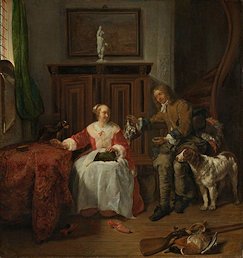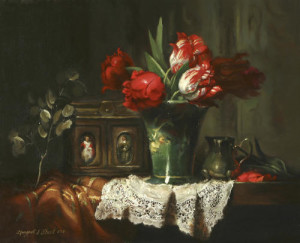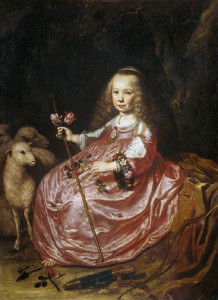The Cupbearer's Habiliments SOLD by Margret E. Short 2007 30x26 Oil on Linen painting #4 Lessons from the Low Countries Exhibit Lawrence Gallery, Portland, Oregon June 1 through 30, 2007 Copyright Margret E. Short Photography, Ben Reed, NW Photo and Digital, Oregon City, Oregon … [Read more...] about The Cupbearer’s Habiliments
Margret's Blog
The Orphans of Wouter Winkel
The Hunter's Present by Gabriel Metsu Inspiration for The Orphans of Wouter Winkel painting #3 Lessons from the Low Countries Exhibit Lawrence Gallery, Portland, Oregon June 1 through 30, 2007 Rembrandt and the Golden Age of Dutch Art Images, by special permission The Rijksmuseum, Amsterdam, The Netherlands … [Read more...] about The Orphans of Wouter Winkel
The Orphans of Wouter Winkel
The Orphans of Wouter Winkel by Margret E. Short 2007 16x20 Oil on Linen painting #3 Sold Lessons from the Low Countries Exhibit Lawrence Gallery, Portland, Oregon June 1 through 30, 2007 Copyright Margret E. Short Photography, Ben Reed, NW Photo and Digital, Oregon City, Oregon … [Read more...] about The Orphans of Wouter Winkel
Metamorphosis
Donkey Drivers beside a Ruin in Italy by Jan Asselijn Inspiration for Metamorphosis painting #2 Lessons from the Low Countries Exhibit June 1 through 30, 2007 Lawrence Gallery, Portland, Oregon Rembrandt and the Golden Age of Dutch Art Images, by special permission The Rijksmuseum, Amsterdam, The Netherlands … [Read more...] about Metamorphosis
Metamorphosis
Metamorphosis 12x12 Oil on Linen by Margret E. Short 2007 painting #2 Sold Lessons from the Low Countries Exhibit June 1 through 30, 2007 Lawrence Gallery, Portland,Oregon Copyright Margret E. Short, Photography Ben Reed, NW Photo and Digital, Oregon City, Oregon … [Read more...] about Metamorphosis
Life and Fecundity
Combined Inspiration for Painting #1 Life and Fecundit Lessons from the Low Countries Exhibit Margret E. Short Lawrence Gallery June 1 through 30, 2007 Rembrandt and the Golden Age of Dutch Art Images by special permission from the Rijksmuseum, Amsterdam, The Netherlands … [Read more...] about Life and Fecundity



